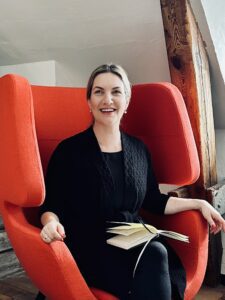The Association for the Advancement of Baltic Studies is pleased to announce that Elīna Vikmane has been awarded the 2023-2024 Aina Birnitis Dissertation-Completion Fellowship in the Humanities for Latvia.
The Aina Birnitis Scholarship supports a year of research and writing to help advanced graduate students in the humanities in the last year of Ph.D. dissertation writing. The fellowship provides a $21,000 stipend for one year plus $1,000 for university fees.
The fellowship is supported by a bequest of Aina Birnitis, a librarian by profession living in Carlton, a suburb of Melbourne, Victoria, Australia.
The 2023 applications were evaluated by the AABS 2023-2024 Grants and Awards Committee consisting of AABS VP for Professional Development Dr. Kaarel Piirimäe, AABS President Dr. Dovilė Budrytė, and AABS Director-at-Large Dr. Daunis Auers. You can find a full list of 2023 awardees here.

Elīna Vikmane completed her studies at the Latvian Academy of Culture in the PhD programme “Arts.” Her research interests are mainly related to museum theory and practice with a focus on dynamics of digital advancement and the social role of culture and cultural heritage in particular. Vikmane has received numerous government and private sector grants to support her research. Her project “Striving Towards Participatory Engagement in Museums: Inquiry into Museum Education Practice in Latvia (MEET)” was a competitive selection by the Latvian Science Council in 2023.
Vikmane is a board member of the Latvian Museum Association, the Latvian Contemporary Art Museum Foundation, and a member of International Council of Museums.
Project Overview
The study “Advancing cybermuseology: Digital innovation diffusion in Latvia’s museum sector” expands the research field of cybermuseology, offering broader definition of cybermuseology and pushes its research boundaries, demonstrating how digital innovation research fits into scope of theoretical museology. It brings a new body of evidence-based knowledge from Latvian museums that explains museums’ experience and capacity to perform their core functions to serve the public through the lens of experience in digital innovation diffusion in the circumstances of the digital divide and a positive bias towards digital innovation diffusion. Additionally, quantitative analysis of digital innovation diffusion is the first-ever attempt at a representative study applied to the entire museum sector. As such, it adds a new – Latvian – voice to the current interdisciplinary diffusionists debate, bringing new knowledge by emphasising the specifics of digital innovation diffusion in the cultural heritage field.
